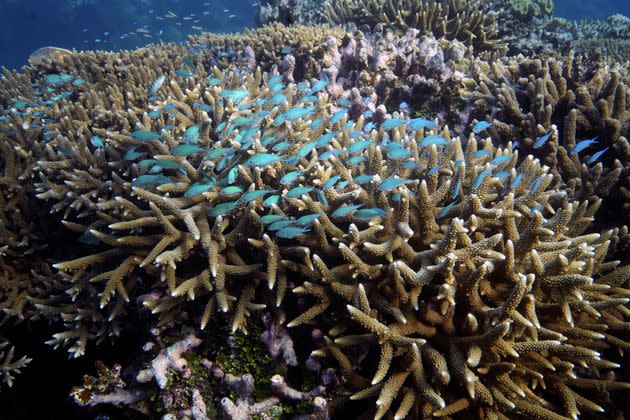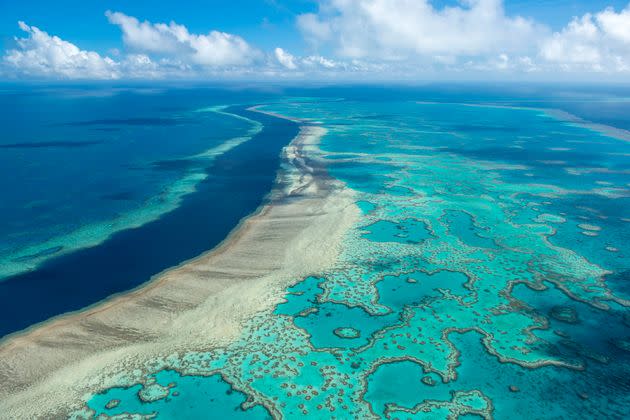Great Barrier Reef Should Be Listed As ‘In Danger,’ U.N. Mission Reports
A delegation from the United Nations recommended Tuesday that the Great Barrier Reef be listed as a World Heritage site “in danger,” urging the world to act quickly to rein in climate change or risk losing the planet’s largest coral ecosystem.
The U.N. mission, a joint effort by UNESCO and the International Union for the Conservation of Nature, said in a new report that climate change continued to “significantly” affect the outstanding universal value of the reef. Without “ambitious, rapid and sustained” action, the site’s celebrated biodiversity and beauty remain in grave danger.
“The GBR has suffered a series of widespread coral bleaching events, occurring with increasing frequency, including four events over the last seven years,” the authors wrote. “The mission team concludes that the property is faced with major threats that could have deleterious effects on its inherent characteristics, and therefore meets the criteria for inscription on the List of World Heritage in Danger.”
The report recognizes that climate change is a world issue that can’t be fixed by Australia alone. But the mission urged the country to adopt emissions targets that would dramatically limit greenhouse gases and protect water quality around the reefs, among 10 priority goals listed in the report.
Officials from UNESCO, the U.N. agency that monitors world sites of outstanding universal value, visited the Great Barrier Reef in March, just as it was undergoing another devastating mass coral bleaching event. Coral bleaching most often occurs when hotter-than-normal seawater in effect cooks delicate coral polyps.

A school of fish swims above corals on Moore Reef in Gunggandji Sea Country off the coast of Queensland in eastern Australia on Nov. 13. Australia’s environment minister said Tuesday that her government will lobby against UNESCO adding the Great Barrier Reef to a list of endangered World Heritage sites.

The warning came in a report drawn from a 10-day mission to the reef in March by officials from UNESCO and the International Union for Conservation of Nature.
The phenomenon sees coral turn ghostly white. Reefs can recover if water temperatures return to normal, but if warm temperatures stick around too long, large swaths of coral can die.
That’s exactly what has happened many times over the past decade along the Great Barrier, causing widespread concern among scientists.
The previous conservative government had faced years of criticism for its support of coal and fossil fuels at the expense of environmental protection. But the newly elected prime minister, Anthony Albanese, has promised a “new era” of climate action.
Still, the country’s environment minister, Tanya Plibersek, said Tuesday that the government would lobby against UNESCO adding the reef to its “in danger” list.
“It’s actually undeniable that climate change is a risk to every reef globally and we need to keep global warming below 1.5C if we’re going to protect not just the Great Barrier Reef but all reefs,” Plibersek said, adding that current leadership was “night and day” compared with the previous government. “I say there is no need to single out the Great Barrier Reef in Australia because there is no government taking the risks to coral reefs more seriously than the Australian government.”
The Environment Minister said Australia will lobby against an ‘in danger’ listing for the Great Barrier Reef as ‘we’ve dealt with’ major concerns.
There are 114 new coal & gas mines in the pipeline across the country.
Let’s be clear Labor - that’s the major concern.— Adam Bandt (@AdamBandt) November 29, 2022
Adam Bandt, the leader of Australia’s Greens political party, said on Twitter that despite those claims, there were more than 100 new coal and gas projects on the docket in the country.
“That’s the major concern,” Bandt wrote.
Environmental groups and scientists said the report bolstered what researchers have been saying for years, urging Australia to quickly move to phase out fossil fuels and invest in climate solutions.
“If you’re surprised by this, you haven’t been paying attention,” Terry Hughes, an emeritus professor at James Cook University, wrote Tuesday.
If you’re surprised by this, you haven’t been paying attention. A UN delegation has again urged "ambitious, rapid and sustained" action on climate change to protect the #GreatBarrierReef.
Way past time for Australia to phase out fossil fuels. https://t.co/LkPuzKAHIO— Terry Hughes (@ProfTerryHughes) November 28, 2022
3: WWF-Australia calls on the Federal and Queensland governments to implement UNESCO's recommendations to help safeguard the future of the Great Barrier Reef and protect our natural environment.
Read more 👉 https://t.co/84yCIDwU46— WWF_Australia (@WWF_Australia) November 29, 2022
